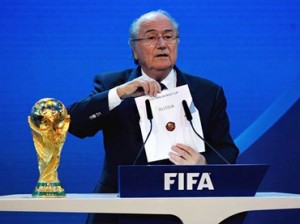Archive for October, 2012
World Cup 2018, the 11 Host Cities.
1 Oct 2012 Eleven Host Cities and twelve stadiums have been selected to host the 64 matches of the 2018 FIFA World Cup Russia.
This was announced on 29 September 2012 at a ceremony with Russian Minister of Sport and chairman of the Russia 2018 Local Organising Committee (LOC), Vitaly Mutko, and FIFA President Joseph S. Blatter, which was broadcast live on Russia’s Channel 1 station.
Among the guests were FIFA Secretary General Jerome Valcke, LOC CEO Alexey Sorokin, Russia’s national team coach Fabio Capello, as well as Brazil’s FIFA World Cup champion Roberto Carlos. 
Having been divided into four geographical clusters, the Host Cities of the 2018 FIFA World Cup have been announced as follows: Moscow, the only city with two stadiums, namely Luzhniki and Spartak (central cluster); St. Petersburg and Kaliningrad (Northern cluster); Nizhny Novgorod, Kazan, Samara, Saransk and Volgograd (Volga cluster); Rostov-on-Don and Sochi (Southern cluster) as well as Ekaterinburg.
The FIFA Executive Committee had approved the venues at its meeting on Friday 28 September 2012 in Zurich. The decision on the general match schedule will be taken at a later date.
“The announcement of the Host Cities is the first concrete step taken in the delivery of the 2018 FIFA World Cup. They make a decisive contribution to the success of the most popular sporting event. We look forward to a productive partnership on our road to the first FIFA World Cup in Eastern Europe,” said the FIFA President.
The early announcement of the 2018 FIFA World Cup Host Cities almost six years ahead of the event is a positive move as it allows the host country stakeholders to make a start on preparing the infrastructure to accommodate the football fans who will flock into Russia in 2018.
“The final selection of the 2018 FIFA World Cup Host Cities is an important milestone en route to hosting the tournament in 2018. This decision launches the full-scale preparation for the FIFA World Cup in the 11 Host Cities across the country,” explained LOC chairman Vitaly Mutko.
“I believe all of them broadly represent the cultural and historical diversity of our nation. At the same time, their energetic nature and connection with Russian footballing tradition will allow the FIFA World Cup to leave a powerful and sustainable legacy in all of them.”
The huge level of anticipation for 2018 was expressed by each Host City as they unveiled their poster at the same time as the announcement, the first time in FIFA history this has been done. To see all the posters and the city profiles please visit the official Russia 2018 website.
Source FIFA
Welcome
We are a group of long experienced European journalists and intellectuals interested in international politics and culture. We would like to exchange our opinion on new Europe and Russia.
Categories
- Breaking News (11)
- CIS (129)
- Climate (2)
- Energy&Economy (115)
- EU Eastern Dimension (85)
- Euro 2012 – Sochi 2014 – World Cup 2018, Sport (43)
- Euro-Integration (135)
- History Culture (198)
- International Policy (261)
- Military (74)
- Interviews (18)
- Italy – Italia – Suisse (47)
- Odd Enough (10)
- Poland and Baltic States (126)
- Religion (31)
- Russia (421)
- Survey (4)
- Turning points (4)
- Ukraine (176)
- Российские страницы (113)
Archives
- November 2020
- October 2020
- September 2020
- August 2020
- July 2020
- May 2020
- April 2020
- March 2020
- January 2020
- December 2019
- November 2019
- October 2019
- September 2019
- August 2019
- July 2019
- June 2019
- May 2019
- April 2019
- March 2019
- February 2019
- December 2018
- November 2018
- October 2018
- September 2018
- August 2018
- July 2018
- June 2018
- May 2018
- April 2018
- March 2018
- February 2018
- January 2018
- December 2017
- November 2017
- October 2017
- September 2017
- August 2017
- July 2017
- May 2017
- March 2017
- January 2017
- December 2016
- November 2016
- October 2016
- September 2016
- July 2016
- June 2016
- May 2016
- April 2016
- February 2016
- January 2016
- November 2015
- October 2015
- September 2015
- June 2015
- April 2015
- March 2015
- February 2015
- January 2015
- December 2014
- November 2014
- October 2014
- September 2014
- August 2014
- July 2014
- June 2014
- May 2014
- April 2014
- March 2014
- February 2014
- January 2014
- December 2013
- November 2013
- October 2013
- September 2013
- August 2013
- July 2013
- June 2013
- May 2013
- April 2013
- March 2013
- February 2013
- January 2013
- December 2012
- November 2012
- October 2012
- September 2012
- August 2012
- July 2012
- June 2012
- May 2012
- April 2012
- March 2012
- February 2012
- January 2012
- December 2011
- November 2011
- October 2011
- September 2011
- August 2011
- July 2011
- June 2011
- May 2011
- April 2011
- March 2011
- February 2011
- January 2011
- December 2010
- November 2010
- October 2010
- September 2010
- August 2010
- July 2010
- June 2010
- May 2010
- April 2010
- March 2010
- February 2010
- January 2010
- December 2009
- November 2009
- October 2009
- September 2009
- August 2009
Our books




